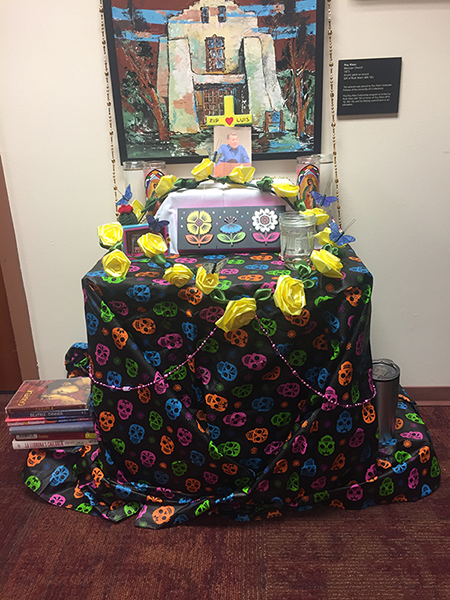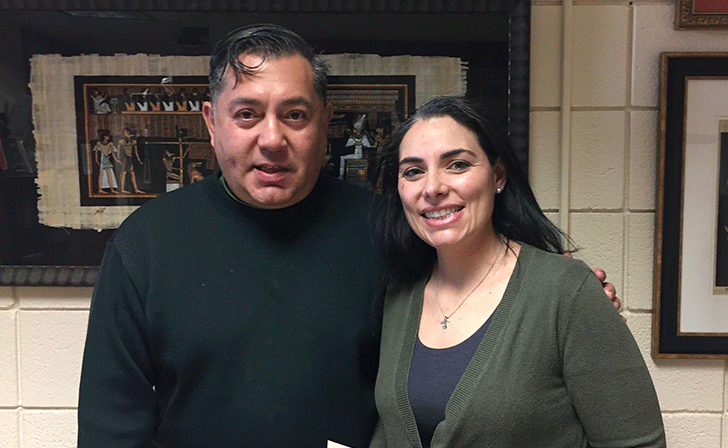AAR Annual Meeting Session to Celebrate the Life and Scholarship of Luis Daniel León (1965–2018)
Professor Luis León in December 2016 at the University of Denver with student and advisee Elaine Penagos, who was named Theta Alpha Kappa's Alpha Lambda Zeta Chapter Outstanding Student for 2016.
Luis León, scholar of American Latina/o/x religions, passed away last year. Colleagues and friends have organized a panel session to honor León's contributions to the field during the 2019 AAR Annual Meeting in San Diego. Details about the session follow an obituary written by Laura E. Pérez of the University of California, Berkeley.
Luis Daniel León was born in Berkeley, California, on February 26, 1965, and died of natural causes in his home in Denver, Colorado, on October 16, 2018.
Luis León received his BA from the University of California, Berkeley, double-majoring in Chicano studies and rhetoric, in 1989. He was awarded an MTS from the Harvard University Divinity School in 1992, concentrating on American religious history. He received his PhD in religious studies from the University of California, Santa Barbara, in 1998, with a concentration on Religion in the Americas, and a dissertation entitled “Religious Movement(s) in the United States – Mexico Borderlands: Toward a Theory of Chicana/o Religious Poetics.”
He was selected as a dissertation fellow, then lecturer, at Carleton College in the Department of Religion and Philosophy, 1997–1999. He was an assistant professor in the Department of Religious Studies at Arizona State University from 1999 to 2003. During that time, he was a postdoctoral fellow at the Stanford Humanities Center, Stanford University, 2002–2003. From 2003 to 2006, Professor León was invited to teach as a visiting assistant professor in the religious studies program and the program of Chicana/o studies in the Department of Ethnic Studies at the University of California, Berkeley.
In 2006, he became an assistant professor at the University of Denver. He achieved tenure in 2009 and full professorship in 2016 at this same institution.
Professor León’s first book was a ground-breaking interdisciplinary contribution to American religious studies, particularly from a transnational perspective, La Llorona’s Children: Religion, Life, and Death in the United States-Mexican Borderlands (University of California Press, 2004). Drawing heavily and productively from earlier Latina/o religious studies and Chicana feminist and queer thought, most particularly the work of queer theorist Gloria Anzaldúa’s Borderlands/La Frontera: The New Mestiza (Aunt Lute, 1987), León argued that a “religious poetics” was discernible in myriad popular religious practices on both sides of the US-Mexico border and in the borderlands communities that embodied a creative religious practice in everyday life that should not be reduced to an idea of an ultimately disempowering pablum or opium of the masses. Instead, he argued, immigrants, the undocumented, Mexicans in Mexico City, and Chicana/os in East Los Angeles elaborated belief systems and practices which often retained and reinterpreted ancestral, Indigenous, not-fully-colonized-or-destroyed ways of understanding reality—beliefs and practices that went beyond current theories of syncretism. In addition to thinking the significance of mestizaje or cultural mixture, and elaborating a theory of “borderlands religions,” his theoretical contributions in this book also included rethinking definitions of religion, the prophetic tradition, curanderismo, and the creative agency of religious practitioners who sought to remedy real life dilemmas through their religious action, which he identified through its Greek roots as fundamentally action, poiesis, and narrative, that is, part of larger, coherent-enough discourses.
Professor León’s second book, The Political Spirituality of Cesar Chavez: Crossing Religious Borders (University of California Press, 2015), rendered Chavez’s spirituality and gender more complexly than existing narratives. Beyond dominant identifications of Chavez as Roman Catholic and as a married heterosexual man who led the UFW farmworkers’ movement through nonviolent activism, León argued that Chavez’s spirituality was larger, more ecumenical, and inadequately contained by labeling his life’s work as the product of Roman Catholicism. León presented Chavez as a man with warm and extensive friendships with men that defy homophobic and binary constructions of masculinity, as well as supportive of lesbian and gay rights (in the language of that era).
Indeed, León’s works, from his first book through his work-in-progress at the time of his death, a third volume entitled “Spiritual Erotics: Affect and Contagion Among Latino Pentecostal Men,” were part of his ongoing Latinx queer studies project to map other existing ways to construct masculinity beyond colonially-imposed notions of the male (the “macho”). His first book generated his idea of “el llorón,” the weeping man, the queering counterpart of La Llorona, the mythical weeping woman. His second book continued this project in essentially queering Chavez’s politics and his spirituality, and his third project, which he conceived as the final portion of a trilogy, focused on the conversion narratives of Latinx men from Roman Catholicism to Pentecostalism, noting the greater degree of friendship, companionship, and loving touch between men that Pentecostal church communities offered his subjects. His third book project was supported by the Louisville Institute.
León’s work was characterized by the centering of US women of color, feminist, and queer interdisciplinary thought beyond simply citing a few sources, thus enriching transnational Americas religious studies. His work was likewise informed by philosophical and critical thought, particularly that of Anzaldúa, Chela Sandoval, Michel Foucault, and Friedrich Nietzsche, and he was deeply committed to decolonizing scholarship beyond the received Eurocentric, patriarchal, heteronormative, and imperialist scholarly and social claims to “universality” that reinforced the injustices of social disenfranchisement, racism, and exploitation.
León was also co-editor of the important three-volume encyclopedia, Religion and American Cultures: Multicultural American Traditions and Popular Religious Expressions, with Gary Laderman (ABC-CLIO Press, 2003), and the author of numerous published articles, encyclopedia entries, book reviews, and online popular culture reviews. He presented his work regularly since 1992 at numerous conferences, symposia, and as invited speaker at national and international universities. Besides the American Academy of Religion, he presented his work at the National Association of Chicana and Chicano Scholars; the American Studies Association; the Latin American Studies Association; the Academy of Catholic Hispanic Theologians in the United States; the Latina/o Studies Association; the National Women’s Studies Association; Emory University; Princeton University; Harvard University; the Graduate Theological Union; George Washington University; the Ohio State University; University of Wyoming; the University of California at Berkeley, Riverside, and Irvine; the University of Kent, England; and Lund University, Sweden.
At the American Academy of Religion, he was a pioneer in the study of queer Latinx and non-Christian Latinx religion and spiritualities, and in 2009 he co-founded a new consultation, Latina/o Critical and Comparative Studies, which was successfully reviewed after five years and continues to expand the study of Latinx religions and spiritualities as culturally complex and hybrid formations. He also served on the Research Grants Jury (2000–01) and Nominations Committee (2009–10) and as a steering committee member of several program units and seminars: Religions, Medicines, and Healing (1999); Latina/o Religion, Culture, and Society (2002–04); Occupying Latino Male Bodies (2015–17); and Religions in the Latina/o Americas (2017–18). He was a participant in the AAR Teaching Workshops and a manuscript reviewer for the Journal of the American Academy of Religion. He was active in the AAR from 1998.
In 1999, he chaired the Program for the Analysis of Religion Among Latinos (PARAL), a task force on Religion and Cultural Identity, and in 2003, he co-organized a symposium “Looking Back, Looking Forward: Latina/o Religiosities and Spiritualities, an Interdisciplinary Symposium,” a generative gathering of a second generation of US Latina/o religious studies scholars jointly hosted by Stanford University and the University of California at Berkeley.
He served as an editorial board member of the historic Aztlán: Journal of Chicano Studies and reviewed manuscripts for the Journal of Performance Studies, the Latino Studies Journal, Sociological Quarterly, the University of California Press, Temple University Press, and University Press of Florida. In addition, he served as a consultant for numerous colloquia sponsored by the Ford Foundation, the Pew Charitable Trust, the Getty Museum, Office of Research for Religion in Society and Culture, the Casey Foundation, and the Lilly Charitable Trust.
 An altar erected by University of Denver religious studies MA student Stefanie Fajardo in Luis Leon’s honor.
An altar erected by University of Denver religious studies MA student Stefanie Fajardo in Luis Leon’s honor.Luis Daniel León, a visionary scholar of American and transnational Americas religious studies, will be missed by his colleagues and students; he leaves a legacy of rich and meaningful work that will, no doubt, continue to bear much fruit in the years to come. In the preface of his first book, León, the son of Pentecostal ministers (both his mother and father served the church), described his father, the Reverend Daniel León, as “perhaps the holiest man I’ve known.” In assessing his dedication, respect, and commitment to creating greater understanding for the plight of Latinxs and for their agency in healing themselves, their communities, and American culture, and in appreciating his compassionate and sensitive focus on the poor, the disenfranchised, and the marginalized among us, Luis León’s scholarship might rightly be seen as a secular ministry, a lifetime’s work guided by the principles of love and service towards the greater good of lived social justice and transformation.
Remembering and Moving with the Work of Luis D. León: A Commemorative Conversation
In this session we gather to celebrate Luis León as friend, scholar, and mentor to a generation of students of Latina/o/x religions. Our purpose is to reflect on how León’s scholarship shaped the fields of Latina/o/x religion and border and borderlands studies over the last two decades, and to imagine together how it will continue to set a course for those and other fields in the future, through the scholars and scholarship that León helped to form.
Saturday, November 23
9:00 – 11:30 AM
San Diego Convention Center-3 (Upper West Level)
Annual Meeting of the American Academy of Religion
Session # A23-113
Jennifer Scheper Hughes, University of California, Riverside, Presiding
Daisy Vargas, University of California, Riverside
La Llorona's Children at the US-Mexico Border: Luis D. León's Decolonial Scholarship in Confronting State Violence
Roger Green, Metropolitan State University of Denver
Employing Luis León's Religious Poetics in the Ayahuasca Diaspora
Adriana Nieto, Metropolitan State University of Denver
A Posthumous Thank You Letter to Luis León
Harold Morales, Morgan State University
La Llorona’s Beloved Children: An Engagement with the Specters of Luis León, Toni Morrison, and Jacques Derrida
Responding:
Miguel De La Torre, Iliff School of Theology
Laura Pérez, University of California, Berkeley
Davíd Carrasco, Harvard University
Session sponsored by the Latina/o Religion, Culture, and Society Unit and North American Religions Unit and Religions in the Latina/o Americas Unit





